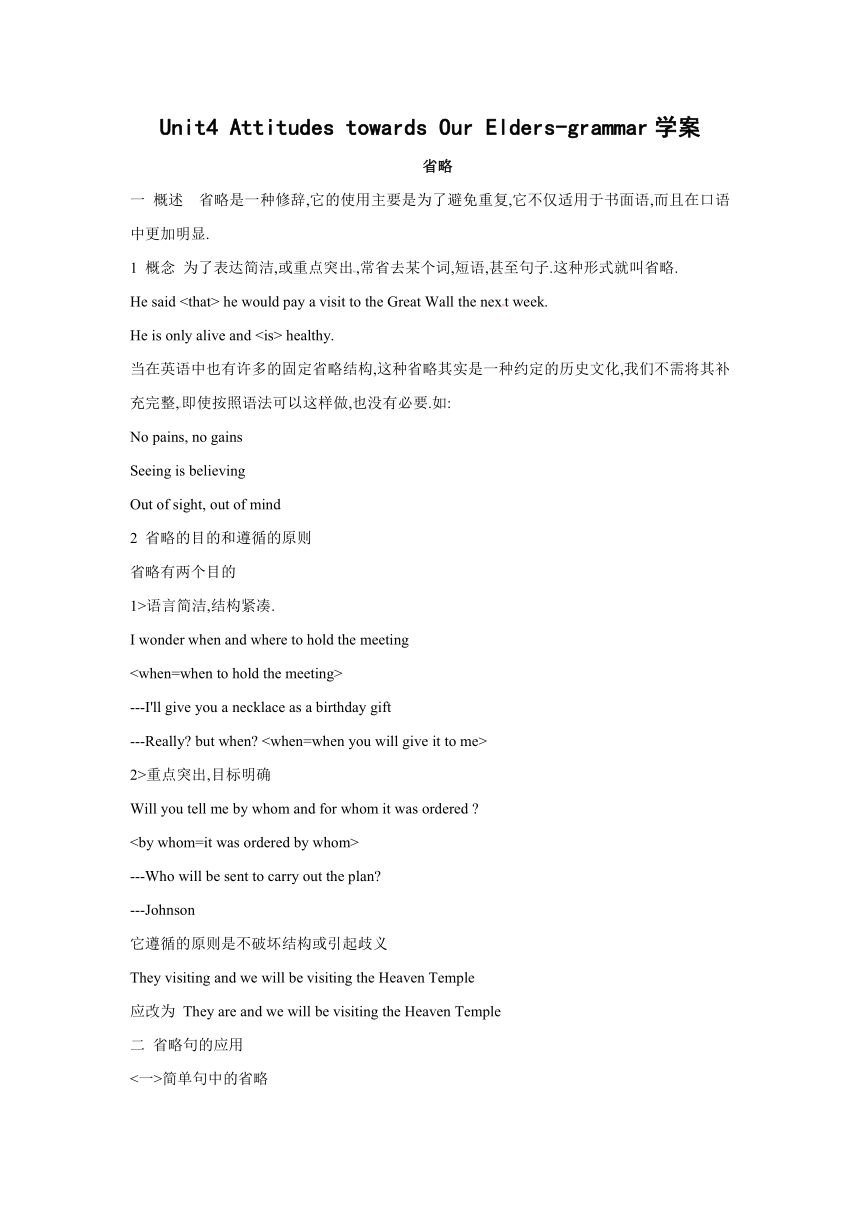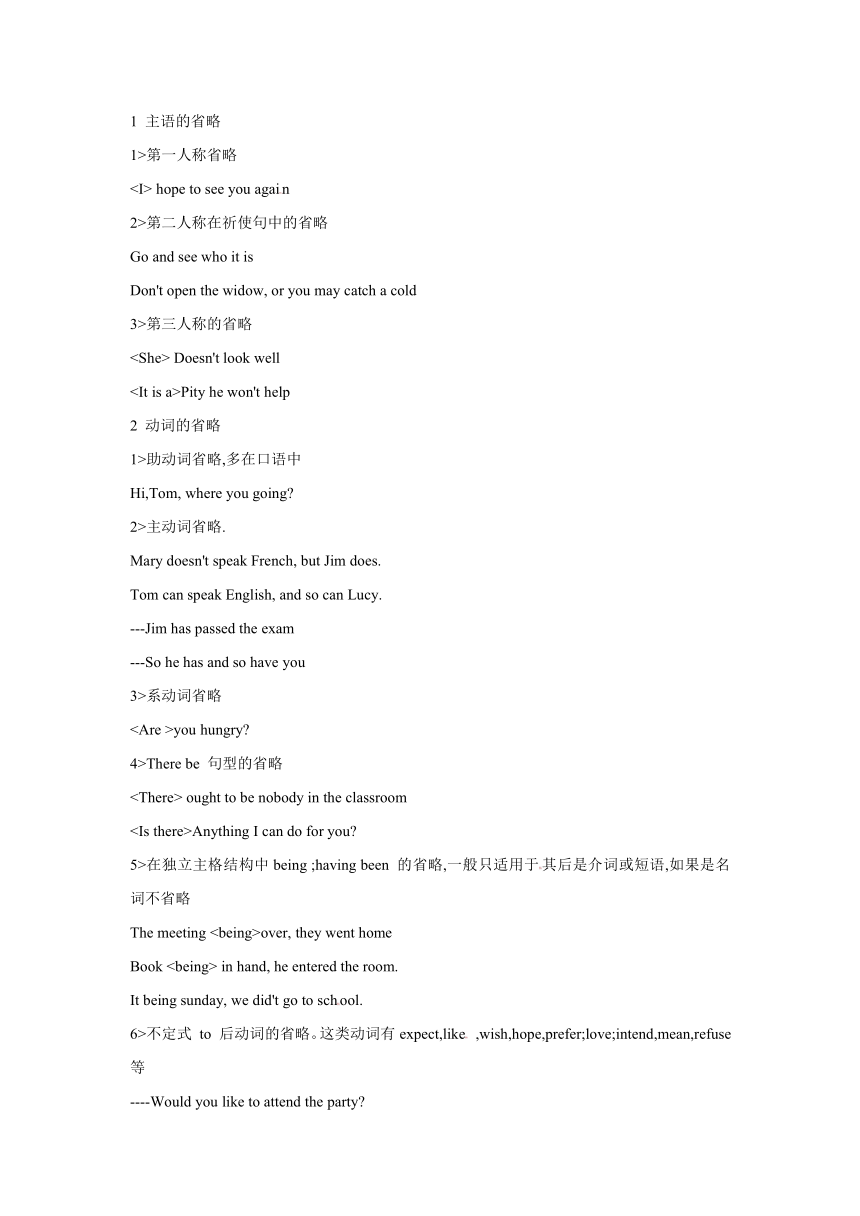Unit4 Attitudes towards Our Elders-grammar学案
文档属性
| 名称 | Unit4 Attitudes towards Our Elders-grammar学案 |

|
|
| 格式 | zip | ||
| 文件大小 | 30.7KB | ||
| 资源类型 | 教案 | ||
| 版本资源 | 冀教版 | ||
| 科目 | 英语 | ||
| 更新时间 | 2012-12-12 00:00:00 | ||
图片预览



文档简介
Unit4 Attitudes towards Our Elders-grammar学案
省略
一 概述 省略是一种修辞,它的使用主要是为了避免重复,它不仅适用于书面语,而且在口语中更加明显.
1 概念 为了表达简洁,或重点突出,常省去某个词,短语,甚至句子.这种形式就叫省略.
He said he would pay a visit to the Great Wall the next week.
He is only alive and healthy.
当在英语中也有许多的固定省略结构,这种省略其实是一种约定的历史文化,我们不需将其补充完整,即使按照语法可以这样做,也没有必要.如:
No pains, no gains
Seeing is believing
Out of sight, out of mind
2 省略的目的和遵循的原则
省略有两个目的
1>语言简洁,结构紧凑.
I wonder when and where to hold the meeting
---I'll give you a necklace as a birthday gift
---Really? but when?
2>重点突出,目标明确
Will you tell me by whom and for whom it was ordered ?
---Who will be sent to carry out the plan?
---Johnson
它遵循的原则是不破坏结构或引起歧义
They visiting and we will be visiting the Heaven Temple
应改为 They are and we will be visiting the Heaven Temple
二 省略句的应用
<一>简单句中的省略
1 主语的省略
1>第一人称省略
hope to see you again
2>第二人称在祈使句中的省略
Go and see who it is
Don't open the widow, or you may catch a cold
3>第三人称的省略
Doesn't look well
Pity he won't help
2 动词的省略
1>助动词省略,多在口语中
Hi,Tom, where you going?
2>主动词省略.
Mary doesn't speak French, but Jim does.
Tom can speak English, and so can Lucy.
---Jim has passed the exam
---So he has and so have you
3>系动词省略
you hungry?
4>There be 句型的省略
ought to be nobody in the classroom
Anything I can do for you?
5>在独立主格结构中being ;having been 的省略,一般只适用于其后是介词或短语,如果是名词不省略
The meetingover, they went home
Book in hand, he entered the room.
It being sunday, we did't go to school.
6>不定式 to 后动词的省略。这类动词有expect,like ,wish,hope,prefer;love;intend,mean,refuse等
----Would you like to attend the party?
----I'd like to
另外,在have to;need to 'ought to;be going to;used to后也省略主动词
I don't like to stay up late,but I used to
I don't want to meet the man,but I had to
<二>从句中的省略
1 定语从句中的省略
1>作宾语的关系代词which;that;whom的省略
Do you know the girl I talked to just now?
Have you seen the bikeI bought from Tom?
如果定语从句中的动词后的介词,放到关系代词前,那么关系代词不能省略。
2>作状语的关系副词when/where/why的省略
That was the last time I met him
2 状语从句中的省略
当状语从句中的主语和主句的主语一致时,可以省略状语从句中的主语和系动词be.
1>连词+pp
He did the work as well as expected
I won't attend the party even if invited
2>连词〈when;while;though>+doing
I came across him when crossing on the street.
Though working in such poor conditions ,he still finished the work on time.
3>连词+名词
Once a thief,he works as a policeman now.
4>连词+形容词
If necessary, please apologize to her
5>连词<,while,as if ,whether>+介词短语
While in England, he learned a foreign language.
另外,我们也可以用so; not 替代上文中的内容,此时常用if so/not
Work hard around the clock. If so, you will succeed.
You should finish the work on time. If not, you will be punished
在某些形容词glad; ready; pleased ;happy 等后。
---Will you carry out the plan?
---I'm glad to
假如语境中有表示时态的have, have been,和be,常在答句中表现出来。
---why haven't you attended the lecture ?
---I'd like to have, but it rained heavily
练习:
1. Tom wanted to play football with his friends in the street, but his father told him______.
A.not to B.not to do C.not to it D.do not to
2. —Do you think Jack is going to watch a football match this weekend?
—_______.
A.I believe not B.I believe not so C.I don’t believe it D.I don’t believe
3. —What do you thing made the girl so glad?
—_______a beautiful necklace.
A.As she received B.Receiving
C.Received D.Because of receiving
4. Father advised me not to say anything until_ _______at the meeting.
A.asking B.to ask C.asked D.ask
5. —Have you watered the flowers?
—No, but_______.
A.I am B.I’m going C.I’m just going to D.I will go
6. —He hasn’t gone to the office up to now.
—Well, he_______.
A.should B.ought to C.ought to go D.ought to have
7. —The war is very likely to break out in the near future.
—I_____ if the situation goes as it is.
A.hope so B.hope not C.am afraid not D.am afraid so
8. —You ought to have given them some advice.
—______,but who cared what I said?
A.So ought you B.So I ought C.So I did D.So did you
9. The man we followed suddenly stopped and looked as if _______whether he was going in the right direction.
A.seeing B.having seen C.to see D.to have sen
10. ______he come, the problem would be settled.
A.Would B.Should C.Shall D.If
11. —Can I see you at 3:00 pm next Monday?
—I______. I will have flown to New York long before then.
A.am afraid not B.am afraid so C.am afraid to D.am afraid not to
12. —Is that a book on farming? If so, I want to borrow_______.
—Yes, it is.
A.this B.it C.one D.the one
13. _______, I will help you with your work.
A.If I am possible B.If it possible C.If possible D.Possible
14. —How are you getting on with your work?
—Oh, I’m sorry. Things aren’t going so well as______.
A.plans B.planning C.planned D.to plan
15. —Are you a volunteer now?
—No, but I_________. I worked for the City Sports Meeting last year,
A.used to B.used to be C.used to do D.was used to
答案与解析:
1.A 不定式作宾语补足语时,其后的内容常被省略,只保留不定式符号to。
2.A
3.B Receiving a beautiful necklace后面省略了前文中的made the girl so glad。
4.C 状语从句中省略了I was。
5.C
6.D 承前省略的不定式后有助动词have时,不定式等号to后要保留have。
7.D
8.C
9.C as if to see是as if he was going to see的活力说法。
10.B 此处是对将来情况的假设。虚拟条件句的谓语部分有should, had或were时,可把if省去,而把should, had或were放在从句的主语之前,构成主谓部分倒装。
11.A
12.B
13.C If possible是If it is possible的活力说法。
14.C
15.B
省略
一 概述 省略是一种修辞,它的使用主要是为了避免重复,它不仅适用于书面语,而且在口语中更加明显.
1 概念 为了表达简洁,或重点突出,常省去某个词,短语,甚至句子.这种形式就叫省略.
He said
He is only alive and
当在英语中也有许多的固定省略结构,这种省略其实是一种约定的历史文化,我们不需将其补充完整,即使按照语法可以这样做,也没有必要.如:
No pains, no gains
Seeing is believing
Out of sight, out of mind
2 省略的目的和遵循的原则
省略有两个目的
1>语言简洁,结构紧凑.
I wonder when and where to hold the meeting
---I'll give you a necklace as a birthday gift
---Really? but when?
2>重点突出,目标明确
Will you tell me by whom and for whom it was ordered ?
---Who will be sent to carry out the plan?
---Johnson
它遵循的原则是不破坏结构或引起歧义
They visiting and we will be visiting the Heaven Temple
应改为 They are and we will be visiting the Heaven Temple
二 省略句的应用
<一>简单句中的省略
1 主语的省略
1>第一人称省略
hope to see you again
2>第二人称在祈使句中的省略
Go and see who it is
Don't open the widow, or you may catch a cold
3>第三人称的省略
2 动词的省略
1>助动词省略,多在口语中
Hi,Tom, where you going?
2>主动词省略.
Mary doesn't speak French, but Jim does.
Tom can speak English, and so can Lucy.
---Jim has passed the exam
---So he has and so have you
3>系动词省略
4>There be 句型的省略
5>在独立主格结构中being ;having been 的省略,一般只适用于其后是介词或短语,如果是名词不省略
The meeting
Book
It being sunday, we did't go to school.
6>不定式 to 后动词的省略。这类动词有expect,like ,wish,hope,prefer;love;intend,mean,refuse等
----Would you like to attend the party?
----I'd like to
另外,在have to;need to 'ought to;be going to;used to后也省略主动词
I don't like to stay up late,but I used to
I don't want to meet the man,but I had to
<二>从句中的省略
1 定语从句中的省略
1>作宾语的关系代词which;that;whom的省略
Do you know the girl
Have you seen the bike
如果定语从句中的动词后的介词,放到关系代词前,那么关系代词不能省略。
2>作状语的关系副词when/where/why的省略
That was the last time
2 状语从句中的省略
当状语从句中的主语和主句的主语一致时,可以省略状语从句中的主语和系动词be.
1>连词
He did the work as well as expected
I won't attend the party even if invited
2>连词〈when;while;though>+doing
I came across him when crossing on the street.
Though working in such poor conditions ,he still finished the work on time.
3>连词
Once a thief,he works as a policeman now.
4>连词
If necessary, please apologize to her
5>连词<,while,as if ,whether>+介词短语
While in England, he learned a foreign language.
另外,我们也可以用so; not 替代上文中的内容,此时常用if so/not
Work hard around the clock. If so, you will succeed.
You should finish the work on time. If not, you will be punished
在某些形容词glad; ready; pleased ;happy 等后。
---Will you carry out the plan?
---I'm glad to
假如语境中有表示时态的have, have been,和be,常在答句中表现出来。
---why haven't you attended the lecture ?
---I'd like to have, but it rained heavily
练习:
1. Tom wanted to play football with his friends in the street, but his father told him______.
A.not to B.not to do C.not to it D.do not to
2. —Do you think Jack is going to watch a football match this weekend?
—_______.
A.I believe not B.I believe not so C.I don’t believe it D.I don’t believe
3. —What do you thing made the girl so glad?
—_______a beautiful necklace.
A.As she received B.Receiving
C.Received D.Because of receiving
4. Father advised me not to say anything until_ _______at the meeting.
A.asking B.to ask C.asked D.ask
5. —Have you watered the flowers?
—No, but_______.
A.I am B.I’m going C.I’m just going to D.I will go
6. —He hasn’t gone to the office up to now.
—Well, he_______.
A.should B.ought to C.ought to go D.ought to have
7. —The war is very likely to break out in the near future.
—I_____ if the situation goes as it is.
A.hope so B.hope not C.am afraid not D.am afraid so
8. —You ought to have given them some advice.
—______,but who cared what I said?
A.So ought you B.So I ought C.So I did D.So did you
9. The man we followed suddenly stopped and looked as if _______whether he was going in the right direction.
A.seeing B.having seen C.to see D.to have sen
10. ______he come, the problem would be settled.
A.Would B.Should C.Shall D.If
11. —Can I see you at 3:00 pm next Monday?
—I______. I will have flown to New York long before then.
A.am afraid not B.am afraid so C.am afraid to D.am afraid not to
12. —Is that a book on farming? If so, I want to borrow_______.
—Yes, it is.
A.this B.it C.one D.the one
13. _______, I will help you with your work.
A.If I am possible B.If it possible C.If possible D.Possible
14. —How are you getting on with your work?
—Oh, I’m sorry. Things aren’t going so well as______.
A.plans B.planning C.planned D.to plan
15. —Are you a volunteer now?
—No, but I_________. I worked for the City Sports Meeting last year,
A.used to B.used to be C.used to do D.was used to
答案与解析:
1.A 不定式作宾语补足语时,其后的内容常被省略,只保留不定式符号to。
2.A
3.B Receiving a beautiful necklace后面省略了前文中的made the girl so glad。
4.C 状语从句中省略了I was。
5.C
6.D 承前省略的不定式后有助动词have时,不定式等号to后要保留have。
7.D
8.C
9.C as if to see是as if he was going to see的活力说法。
10.B 此处是对将来情况的假设。虚拟条件句的谓语部分有should, had或were时,可把if省去,而把should, had或were放在从句的主语之前,构成主谓部分倒装。
11.A
12.B
13.C If possible是If it is possible的活力说法。
14.C
15.B
